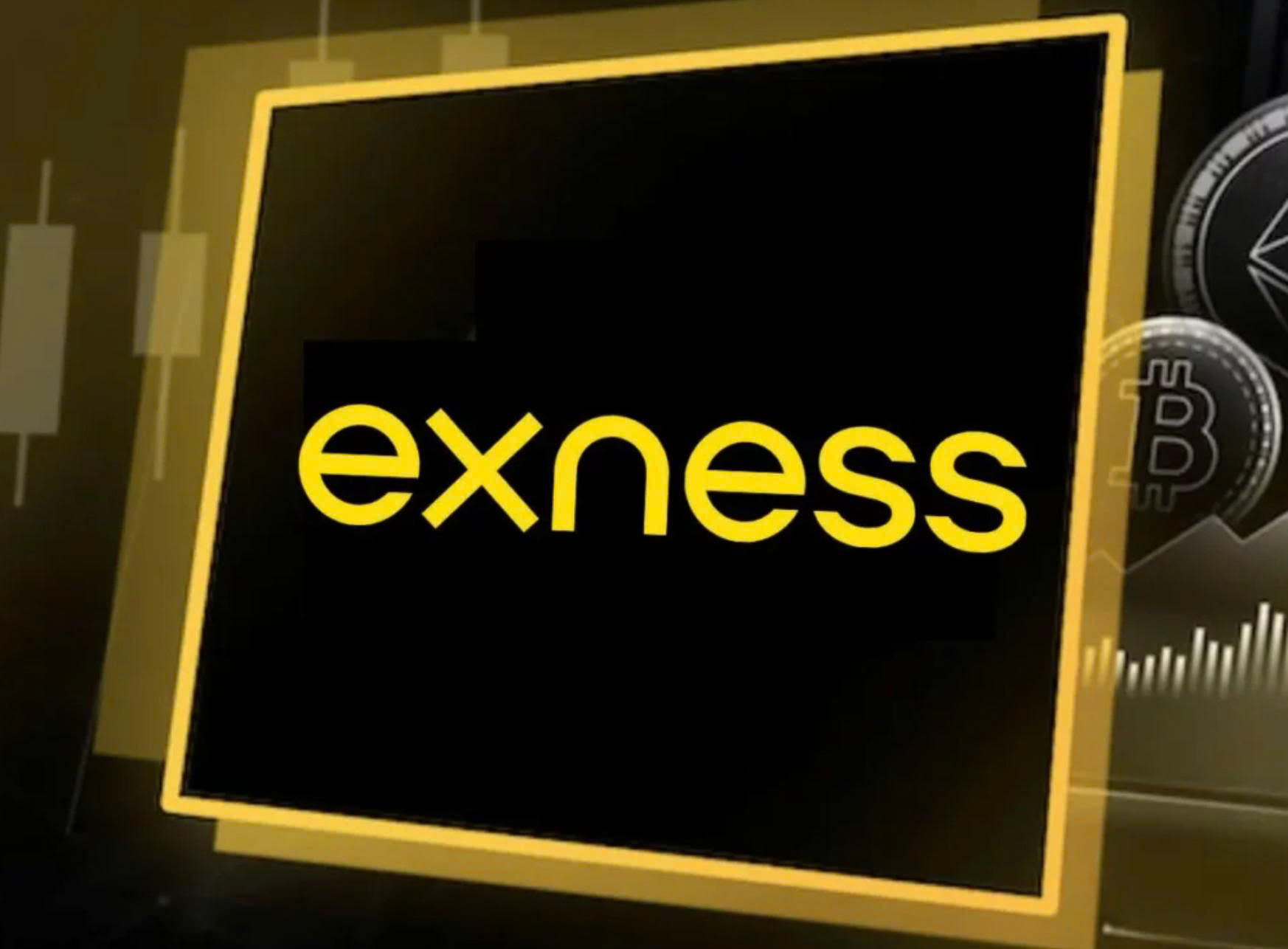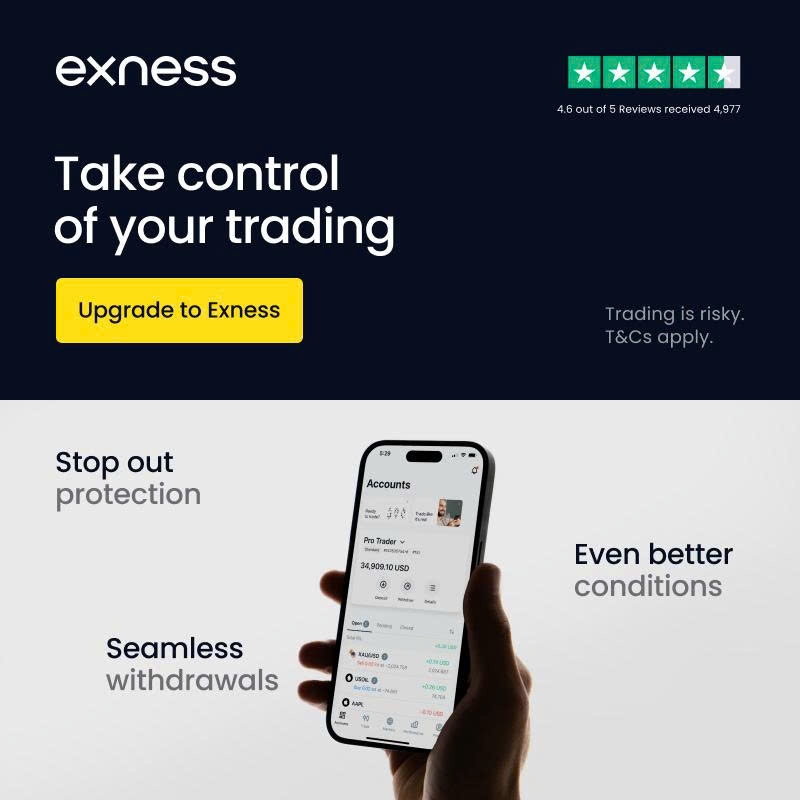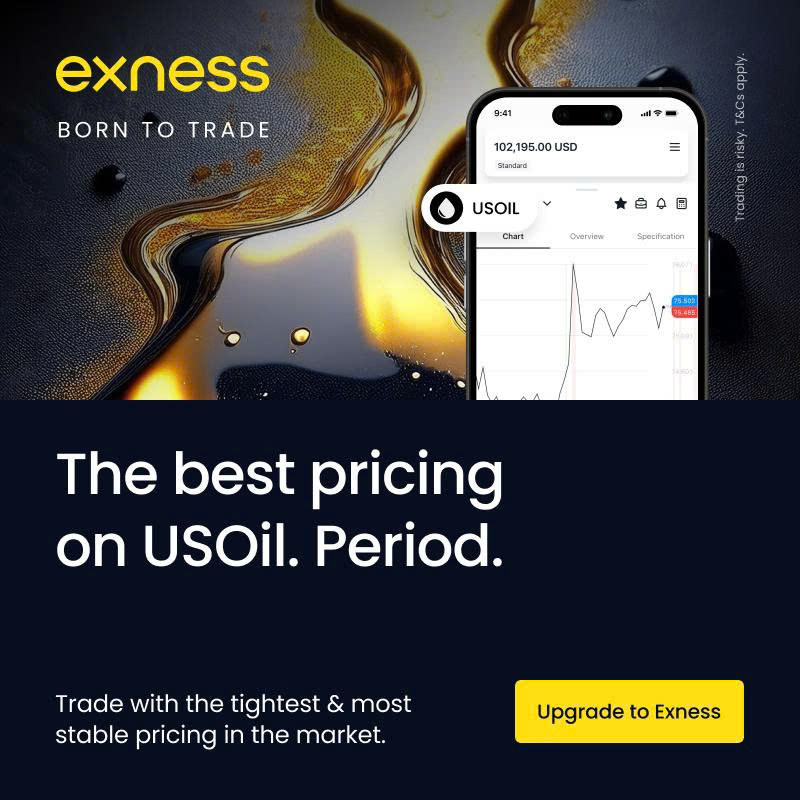
7 minute read
Exness or Binance Compared: A Comprehensive Review
from Exness or Binance
In the fast-evolving world of online trading and investing, choosing the right platform can make or break your financial journey. Two prominent names in the industry, Exness or Binance, cater to different yet overlapping audiences. While Exness is a leading forex and CFD broker, Binance dominates the cryptocurrency exchange market. This article provides an in-depth comparison of Exness or Binance, covering their features, fees, usability, security, and more, to help you decide which platform suits your needs in 2025.

✅ Trade with Exness now: Open An Account or Visit Brokers 👈
Overview of Exness or Binance
Exness: A Powerhouse in Forex and CFD Trading
Founded in 2008, Exness is a globally recognized forex and CFD broker, regulated by top-tier authorities like the FCA (UK), CySEC (Cyprus), and FSCA (South Africa). It offers trading on forex, commodities, indices, stocks, and cryptocurrencies through Contracts for Difference (CFDs). Exness is known for its tight spreads, high leverage, and user-friendly platforms, making it a favorite among retail traders.
Binance: The Crypto Exchange Giant
Launched in 2017, Binance has grown into the world’s largest cryptocurrency exchange by trading volume. It provides a vast ecosystem for buying, selling, and trading cryptocurrencies, alongside services like staking, futures trading, and decentralized finance (DeFi). Regulated in multiple jurisdictions, Binance appeals to crypto enthusiasts and institutional investors alike.
While Exness focuses on traditional financial markets with a crypto CFD component, Binance is a crypto-native platform. Let’s dive into the key differences and similarities to help you choose.
Key Features Comparison
1. Asset Classes
Exness: Offers over 100 financial instruments, including forex pairs, metals (gold, silver), energy (oil, gas), indices (S&P 500, NASDAQ), stocks, and crypto CFDs (e.g., Bitcoin, Ethereum). Since these are CFDs, you don’t own the underlying asset but speculate on price movements.
Binance: Boasts over 350 cryptocurrencies, from major coins like Bitcoin (BTC) and Ethereum (ETH) to altcoins and meme coins. Binance also supports NFT trading, crypto futures, and options, making it a one-stop shop for crypto enthusiasts.
Verdict: Exness is ideal for diversified trading across multiple asset classes, while Binance is the go-to for crypto-specific trading and ownership.
2. Trading Platforms
Exness: Supports MetaTrader 4 (MT4) and MetaTrader 5 (MT5), industry-standard platforms known for advanced charting, automated trading (Expert Advisors), and customization. Exness also offers a proprietary mobile app and web terminal for seamless trading.
Binance: Provides a robust web-based platform, a mobile app, and a desktop client. Its interface is tailored for crypto trading, with features like spot trading, futures, and staking dashboards. Binance also offers API access for algorithmic traders.
Verdict: Exness excels for traders familiar with MT4/MT5, while Binance’s platform is more intuitive for crypto-focused users.
3. Fees and Spreads
Exness: Known for ultra-low spreads, especially on its Raw Spread and Zero accounts (as low as 0.0 pips for major forex pairs). It charges commissions on certain account types ($3.5 per lot for Raw Spread). Swap fees apply for overnight positions, but Exness offers swap-free accounts for Islamic traders.
Binance: Operates a maker-taker fee model, with spot trading fees starting at 0.1% (lower with BNB payments or higher trading volumes). Futures trading fees are even lower (0.02% maker, 0.04% taker). Staking and withdrawal fees vary by cryptocurrency.
Verdict: Exness is more cost-effective for forex and CFD trading, while Binance offers competitive fees for crypto trading, especially for high-volume traders.
4. Leverage and Margin
Exness: Offers some of the highest leverage in the industry, up to 1:2000 for forex (depending on the account and region). Crypto CFDs have lower leverage (up to 1:400). High leverage increases both potential profits and risks.
Binance: Provides leverage up to 1:125 for crypto futures, which is substantial but lower than Exness’s forex offerings. Margin trading is available for select cryptocurrencies, with varying requirements.
Verdict: Exness is better for traders seeking high leverage, but Binance’s leverage is sufficient for most crypto futures trading.
Usability and User Experience
Exness: Streamlined for All Levels
Exness caters to both beginners and professionals. Its account types—Standard, Pro, Raw Spread, and Zero—allow users to choose based on experience and trading style. The platform supports multiple languages, offers 24/7 customer support, and provides educational resources like webinars and market analysis. Deposits and withdrawals are fast, with options like bank cards, e-wallets (Skrill, Neteller), and crypto.
Binance: Crypto-Centric Interface
Binance’s interface is user-friendly but can feel overwhelming for newcomers due to its extensive features. It offers a “Lite” mode for beginners and a “Pro” mode for advanced traders. Binance Academy provides free crypto education, and its customer support is available via live chat and email. Withdrawal times vary by blockchain, and fees apply for certain transactions.
Verdict: Exness is more beginner-friendly for traditional trading, while Binance suits crypto users comfortable with a feature-rich platform.

✅ Trade with Exness now: Open An Account or Visit Brokers 👈
Security and Regulation
Exness: Robust Regulation
Exness is regulated by multiple reputable authorities, ensuring client fund segregation, negative balance protection, and transparent operations. It uses advanced encryption and offers two-factor authentication (2FA). Exness has a strong track record with no major security breaches.
Binance: Evolving Security Measures
Binance has faced regulatory scrutiny in the past but has strengthened its compliance framework, securing licenses in jurisdictions like Dubai and Japan. It uses cold storage for most user funds, offers 2FA, and has a Secure Asset Fund for Users (SAFU) to cover losses in extreme cases. However, crypto exchanges inherently face higher risks due to hacking vulnerabilities.
Verdict: Exness has an edge in regulatory trust, but Binance’s security measures are robust for a crypto exchange.
Account Types and Accessibility
Exness
Minimum Deposit: $10 for Standard accounts, higher for professional accounts ($200+).
Account Types: Standard, Standard Cent (for micro-lots), Pro, Raw Spread, Zero.
Accessibility: Available in most countries, with restrictions in the US and a few others due to regulatory constraints.
Binance
Minimum Deposit: No minimum for spot trading; futures and margin trading require initial funding.
Account Types: Basic, Advanced, and VIP tiers based on trading volume and BNB holdings.
Accessibility: Restricted in some regions (e.g., parts of the US) but offers Binance.us as an alternative.
Verdict: Exness is more accessible for low-budget traders, while Binance caters to crypto investors of all levels.
Additional Features
Exness
Social Trading: Allows users to copy trades from experienced traders.
Market Analysis: Daily insights and technical analysis from experts.
VPS Hosting: Free for high-volume traders to ensure low-latency execution.
Binance
Staking and Yield Farming: Earn passive income on crypto holdings.
Binance Earn: Offers savings accounts and liquidity pools.
NFT Marketplace: Buy, sell, and create non-fungible tokens.
Verdict: Binance offers more crypto-specific features, while Exness focuses on trading tools and analytics.
Pros and Cons
Exness Pros
Ultra-low spreads and high leverage.
Regulated by top-tier authorities.
Supports MT4/MT5 for advanced trading.
Fast withdrawals and low minimum deposits.
Exness Cons
Limited to CFDs, no direct crypto ownership.
High leverage carries significant risk.
Not available in the US.
Binance Pros
Extensive range of cryptocurrencies.
Low trading fees, especially for BNB users.
Diverse features like staking and NFTs.
Global reach with a strong mobile app.
Binance Cons
Complex interface for beginners.
Regulatory uncertainty in some regions.
Higher risk of hacks compared to forex brokers.
Conclusion: Which Platform Should You Choose?
The choice between Exness or Binance depends on your trading goals and preferences:
· Choose Exness if:
You want to trade forex, commodities, indices, or crypto CFDs.
You prefer a regulated broker with tight spreads and high leverage.
You’re comfortable with MT4/MT5 or need a beginner-friendly platform.
· Choose Binance if:
You’re focused on buying, holding, or trading cryptocurrencies.
You want access to staking, futures, or NFTs.
You’re okay navigating a crypto-specific platform with more features.
For diversified traders, Exness offers a broader range of assets and lower entry barriers. For crypto enthusiasts, Binance’s ecosystem is unmatched in depth and variety.
✅ Trade with Exness now: Open An Account or Visit Brokers 👈
Read more:

